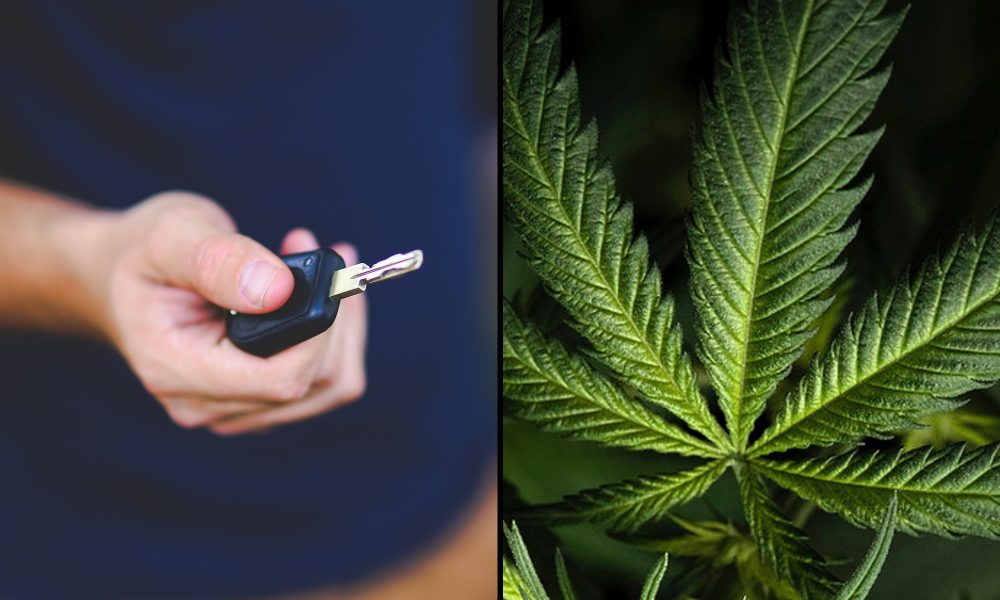Americans view driving under the influence of marijuana as one of the issues they’re “least concerned” about when compared to other dangerous behaviors such as operating a vehicle while distracted by cellphones, speeding or getting behind the wheel after drinking alcohol, according to a new Pew Research Center poll.
The survey, which looked at public opinion on traffic concerns, found a majority of Americans (82 percent) still regard driving while high on cannabis to be either a major problem (37 percent) or minor problem (45 percent) in their area. But respondents ranked it lowest among six behaviors included in the survey.
For example, 96 percent of respondents said they considered driving while distracted by cellphones a problematic issue in their community. Another 94 percent said speeding was a problem, while 93 percent said aggressive driving behaviors such as a tailgating was a concern.
Ninety-two percent identified drunk driving as a problem where they live.
– Drunk driving (51%)
– Endangering cyclists or pedestrians (47%)
– Driving while using marijuana (37%) https://t.co/XfliREWgw2— Pew Research Center (@pewresearch) November 13, 2024
The poll also examined differences in opinion among different regions and states, with people living in urban areas the most likely to say marijuana-impaired driving is a major problem, at 42 percent. Thirty-six percent of those in suburban regions and 35 percent in rural communities said the same.
“Out of the behaviors we asked about, U.S. adults are least concerned about people driving under the influence of marijuana in their area,” Pew said.

Via Pew Research Center.
The analysis noted that respondents living in states that have legalized cannabis were “slightly more likely than people in states where this is illegal to say driving while high is a major problem in their community (40 percent vs 35 percent).”
Researchers didn’t provide theories about potential reasons for that difference, but one possibility is that many states that have enacted legalization have amplified education and awareness about the issue, with public service announcements and strategies meant to raise attention to laws prohibiting the activity, for example.
The Pew survey involved interviews with 5,410 American adults from August 12-18, with a +/-1.6 percentage point margin of error.
Concerns about the implications of legalization on traffic safety are a consist theme of policy debates about the reform, with prohibitionists frequently claiming that states with legal cannabis markets see increased cases of impaired driving and accidents.
There’s been a lack of scientific consensus on that argument, with numerous studies reaching divergent conclusions about the relationship between the policy change and traffic trends.
Legalization supporters and opponents are broadly aligned on the need to prevent cannabis-impaired driving, but advocates have long pointed out that the issue exists in legal and non-legal states alike. They argue that enacting a regulated framework for marijuana presents key opportunities for policymakers to educate the public about the dangers of driving after consuming cannabis and allocate targeted resources to combat the issue, often utilizing revenue from legal marijuana sales.
Meanwhile, a recent scientific review found that most available research on cannabis-impaired driving identified “no significant linear correlations between blood THC and measures of driving,” although there was an observed relationship between levels of the cannabinoid and reduced performance in some more complex driving situations.
In a separate report earlier this year, the National Highway Traffic Safety Administration (NHTSA) said there’s “relatively little research” backing the idea that THC concentration in the blood can be used to determine impairment, calling into question laws in several states that set “per se” limits for cannabinoid metabolites.
Similarly, a Department of Justice (DOJ) researcher said in February that states may need to “get away from that idea” that marijuana impairment can be tested based on the concentration of THC in a person’s system.
“If you have chronic users versus infrequent users, they have very different concentrations correlated to different effects,” Frances Scott, a physical scientist at the National Institute of Justice (NIJ) Office of Investigative and Forensic Sciences under DOJ, said.
That issue was also examined in a recent federally funded study that identified two different methods of more accurately testing for recent THC use that accounts for the fact that metabolites of the cannabinoid can stay present in a person’s system for weeks or months after consumption.
Back in 2022, Sen. John Hickenlooper (D-CO) sent a letter to the Department of Transportation (DOT) and NHTSA seeking an update on the status of a federal report into testing THC-impaired drivers. The department was required to complete the report under a large-scale infrastructure bill that President Joe Biden (D) signed, but it missed that deadline and is unclear how much longer it will take.
Last summer, a congressional report for a Transportation, Housing and Urban Development, and Related Agencies (THUD) bill said that the House Appropriations Committee “continues to support the development of an objective standard to measure marijuana impairment and a related field sobriety test to ensure highway safety.”
A study published in 2019 concluded that those who drive at the legal THC limit—which is typically between two to five nanograms of THC per milliliter of blood—were not statistically more likely to be involved in an accident compared to people who haven’t used marijuana.
Separately, the Congressional Research Service in 2019 determined that while “marijuana consumption can affect a person’s response times and motor performance … studies of the impact of marijuana consumption on a driver’s risk of being involved in a crash have produced conflicting results, with some studies finding little or no increased risk of a crash from marijuana usage.”
Another study from 2022 found that smoking CBD-rich marijuana had “no significant impact” on driving ability, despite the fact that all study participants exceeded the per se limit for THC in their blood.

